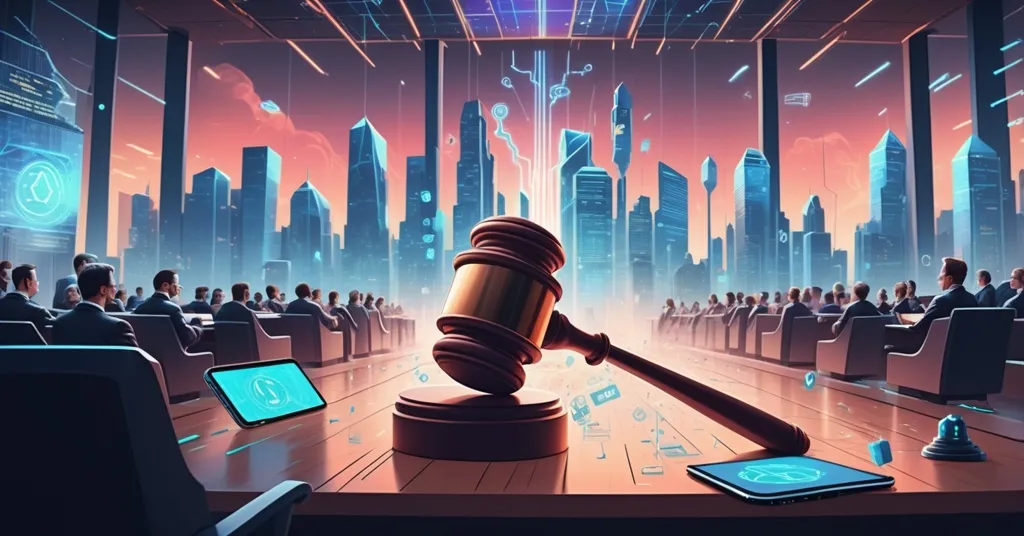Getty Images Sues Stability AI: Landmark Case to Redefine AI Copyright Law

Getty Images vs. Stability AI: A Legal Showdown That Could Redefine AI and Copyright Law
A blockbuster legal battle is unfolding at London’s High Court as Getty Images takes on Stability AI, the creators of the AI image-generating tool Stable Diffusion, over allegations of massive copyright infringement. This case isn’t just a corporate spat—it’s a potential turning point for how artificial intelligence intersects with intellectual property rights, with ripples that could reach the worlds of creativity, tech innovation, and even decentralization.
- Core Dispute: Getty Images accuses Stability AI of using millions of copyrighted photos without permission to train Stable Diffusion.
- Legal Stakes: Claims include copyright infringement, database rights violations, trademark misuse, and passing off.
- Bigger Picture: The outcome could shape AI copyright law, impact the UK’s tech hub status, and spark debates on data ownership.
The Heart of the Conflict: Copyright in the Age of AI
Getty Images, a titan in the world of stock photography, is representing around 50,000 photographers and content creators in this lawsuit, claiming that Stability AI scraped millions of their copyrighted images from the internet to train Stable Diffusion. This isn’t a small-time grievance—it’s a full-frontal assault on how generative AI tools are built, often by hoovering up vast swaths of online data with little regard for who owns it. Getty’s legal claims are a laundry list of grievances: outright copyright infringement, violations of database rights (the structured collections of images they’ve curated), trademark infringement, and “passing off,” which means presenting something as if it’s affiliated with Getty when it’s not. This isn’t just about money—it’s about whether AI companies can keep playing fast and loose with other people’s work. For more on the background of this clash, check out the ongoing legal battle between Getty Images and Stability AI.
For those new to the tech, let’s break down what Stable Diffusion is. Think of it as a digital artist that can whip up stunning visuals based on a text prompt like “a futuristic city at dusk.” It does this through deep learning, having been trained on billions of images to recognize patterns, styles, and concepts. The problem? Many of those images—potentially including Getty’s meticulously curated catalog—are copyrighted, and using them without permission or payment raises both ethical and legal red flags. If you’re a photographer who spent years building a portfolio only to see an AI churn out knockoffs for free, you’d be pissed too.
Stability AI’s Defense: A Pixel in a 4K World?
Stability AI isn’t rolling over. Their defense is a masterclass in legal gymnastics, arguing that any reproduction of Getty’s images in their output is so tiny—“infinitesimally small,” as they put it—that it doesn’t count as a substantial copy of any original work. Apparently, “infinitesimal” is the new “sorry, not sorry” in tech speak. They’re also leaning on a quirky bit of UK copyright law called the “pastiche” provision, a fair dealing exception that allows limited use of copyrighted material for parody, stylistic imitation, or creative mashups. In essence, they’re saying Stable Diffusion’s creations are more like artistic tributes than theft. For a deeper dive into this defense, see this expert analysis on fair use and pastiche in UK law.
On top of that, they’re hiding behind “hosting” and “caching” safe harbors under UK e-commerce rules, positioning themselves as a neutral middleman rather than a direct offender. It’s the classic “we’re just a dumb pipe” argument—don’t blame us, we’re just the tech guys. A Stability AI spokesperson doubled down, framing this as a fight for “technological innovation and freedom of ideas,” claiming their AI taps into collective human knowledge rather than ripping off specific works. But let’s be real: if your “collective knowledge” includes someone else’s copyrighted portfolio, that argument might not hold water in court.
Getty’s Stand: A Fight for Fairness
Getty isn’t buying the high-minded rhetoric. CEO Craig Peters has been candid about the brutal cost of this battle, with millions of dollars sunk into lawsuits filed in both the UK and the US due to uncertainty over where Stability AI’s training data was processed. If it happened outside the UK, do British courts even have the right to rule? As Sukanya Wadhwa, an associate at intellectual property law firm Brandsmiths, pointed out:
The Court will need to first consider how and where the AI training has been done. If it’s outside the U.K., do the U.K. courts have the right authority to decide on copyright infringement?
This jurisdictional mess isn’t just a technicality—it’s a glaring reminder of how global tech operates in a legal gray zone. Getty’s legal rep, Lindsay Lane, insists this isn’t about crushing AI but ensuring creators get a fair damn deal. If AI firms want to play in the creative sandbox, they need to respect the sandbox’s owners. It’s a reasonable plea, but with legal bills piling up, you have to wonder if Getty’s deep pockets can outlast Stability AI’s war chest, recently boosted by a cash injection from WPP, the world’s largest advertising company, in March 2025. For more on the jurisdictional challenges, take a look at this report on AI lawsuits and UK tech innovation.
AI Training 101: How Does Stable Diffusion Work?
For the uninitiated, let’s unpack how tools like Stable Diffusion are built. Imagine a giant digital blender. You toss in billions of images—everything from stock photos to random internet memes—and the AI churns through them, learning how to mix colors, shapes, and themes. Once trained, it can spit out a brand-new image based on a prompt, like “a dragon soaring over a desert.” The catch is, some of those ingredients in the blender belong to people like Getty’s photographers, who never signed up to have their work pureed into an algorithm. Stability AI argues the result isn’t a direct copy but a transformative creation. Yet, to a creator whose livelihood depends on originality, that distinction might feel like splitting hairs with a sledgehammer. Curious about the broader implications of AI training on copyright? This discussion on AI training and copyright law offers some insights.
The Bigger Picture: AI, Creativity, and Legal Precedent
Zooming out, this case is a legal minefield with stakes that go way beyond two companies duking it out. Legal experts are calling it uncharted territory, and for good reason. Rebecca Newman of Addleshaw Goddard warns that a win for Getty could open the floodgates to more lawsuits against AI developers, potentially choking off innovation if protections swing too hard toward copyright holders. On the other hand, a victory for Stability AI might greenlight unchecked data scraping, leaving artists high and dry. Cerys Wyn Davies of Pinsent Masons nails the broader impact, noting that the High Court’s ruling—expected after a full trial in summer 2025—could reshape market practices and the UK’s status as a post-Brexit tech haven. Screw this up, and the UK risks alienating either tech startups or creative industries, both key to its economic swagger. For the latest updates on the case timeline, see this report on the UK High Court lawsuit details.
Then there’s the human side. Heavyweights like Sir Elton John have sounded the alarm, demanding stronger protections for artists as AI threatens to disrupt entire livelihoods. When a music icon steps into a tech fight, you know it’s not just about legalese—it’s about whether creators can survive when machines can mimic their work for pennies. Imagine a freelance photographer losing gigs because an AI churns out near-identical shots for free. It’s a gut punch, not unlike crypto miners getting undercut by centralized exchanges muscling into decentralized spaces.
Playing Devil’s Advocate: Is Getty Overreaching?
Let’s flip the script for a second. Could Getty’s hardline stance backfire? If courts slap down Stability AI with punitive damages or strict rules, it might scare off AI innovation altogether. We’ve seen this in crypto—overzealous regulation often stifles startups before they can challenge the status quo. AI has the potential to democratize creativity, letting anyone with a laptop generate art or visuals without needing a studio. If Getty wins big, will that vision get crushed under legal red tape? On the flip side, unchecked AI could erode the very cultural foundation it draws from, much like scams in crypto tarnish the industry’s rep. It’s a tightrope, and neither side is 100% saint or sinner. For a broader perspective on AI and copyright challenges, this overview of AI copyright issues is worth exploring.
A Decentralized Fix? Blockchain’s Potential Role
Here’s where things get juicy for our Bitcoin and blockchain crowd. This fight over data ownership echoes battles we’ve seen in the crypto space, where centralized systems often screw over the little guy. What if blockchain tech could step in as a referee? Picture this: every digital image or artwork timestamped on a ledger like Bitcoin’s, or tied to an Ethereum-based NFT for immutable proof of ownership. Platforms like OpenSea already do this for digital art—why not extend it to AI training datasets? Smart contracts could automate licensing, ensuring creators get paid every time their work is used, while AI firms get clean, legal data to work with. It’s not perfect—scalability and adoption hurdles loom large—but it aligns with the decentralization ethos of reclaiming control from middlemen, whether they’re banks or Big Tech.
This isn’t just pie-in-the-sky thinking. Data sovereignty is at the heart of Bitcoin’s mission to disrupt centralized finance, and it could do the same for IP in the AI era. Just as Bitcoin challenges banks, blockchain could challenge centralized data aggregators or IP holders, creating a transparent system where creators aren’t left holding the bag. Hell, it might even prevent lawsuits like this one if licensing was baked into the tech from the start. Food for thought as we watch this courtroom drama unfold.
Financial Titans Clash: Who Can Afford the Fight?
Let’s talk money, because this isn’t just a legal slugfest—it’s a test of endurance. Stability AI isn’t some garage startup; with hundreds of millions in funding, including that shiny WPP investment, they’ve got the cash to drag this out. Getty, meanwhile, is bleeding millions across dual lawsuits in the UK and US, a burden Peters openly gripes about. Sound familiar? It’s not unlike the crypto world, where well-funded projects often outlast smaller players in regulatory fights. If Stability AI can weather the storm, it might set a precedent for other AI firms to muscle through IP challenges. But if Getty prevails, it could embolden creators to fight back, even if they can’t match Big Tech’s war chest. Either way, the fallout will hit far beyond these two giants. For a detailed look at the legal strategies, check out this summary of the Getty vs. Stability AI legal battle.
Parallels to Crypto’s Wild West
Stepping back, this whole mess mirrors the early days of crypto regulation. Bitcoin and blockchain tech disrupted financial norms, much like AI is shaking up creativity and ownership. Both faced the same core question: how do you foster groundbreaking innovation without trampling individual rights? In crypto, we’ve seen the pendulum swing from lax oversight to heavy-handed crackdowns. AI might be on a similar path. A ruling favoring Stability AI could create a free-for-all, akin to crypto’s ICO boom—exciting, but ripe for abuse. A Getty win might mirror post-2018 crypto regulations, reining in excess but risking stagnation. The trick is balance, and with preliminary rulings already underway (like Stability AI’s failed strike-out attempt in late 2023), the stakes couldn’t be higher.
Why This Matters Now
With the full trial slated for summer 2025, you might wonder why this grabs headlines today. Simple: AI isn’t waiting for a verdict. Tools like Stable Diffusion keep evolving, and parallel lawsuits—like the New York Times vs. OpenAI in the US—signal a global reckoning for AI and IP. The UK’s decision will send shockwaves, especially as it jockeys to be a tech leader. Plus, the ethical debate rages on: should AI firms scrape the internet without consent, or do creators deserve a say? It’s a data ownership fight that hits close to home for anyone who cheers Bitcoin’s push for privacy and control. The courtroom might be quiet for now, but the ideas at stake are screaming for attention. If you’re curious about public reactions, this community discussion on Stable Diffusion and copyright captures some raw opinions. For a deeper legal perspective, explore the implications of AI copyright law in cases like this.
Key Questions and Takeaways
- What is Getty Images accusing Stability AI of?
Getty alleges Stability AI used millions of copyrighted photos without permission to train Stable Diffusion, violating copyright, database rights, and trademark laws, while also engaging in passing off. - How is Stability AI defending itself?
They claim the use of Getty’s content is negligible and not substantial, invoke fair dealing under the UK’s pastiche exception, and seek protection as a neutral platform under hosting and caching safe harbors. - Why is this case a big deal for AI and creative industries?
It could redefine copyright law for AI, balancing the drive for innovation against artist protections, and influence the UK’s role as a global tech hub. - Can blockchain technology offer a solution to these IP disputes?
Yes, blockchain could provide transparent, immutable records of content ownership via NFTs or ledgers, automating fair licensing for AI training and championing decentralization. - What happens if jurisdictional uncertainties persist?
Legal limbo over where AI training occurs could stall justice, with cases ping-ponging between countries like the UK and US, leaving creators and tech firms in a frustrating gray zone.
As this legal saga unfolds, one thing is crystal clear: the clash between Getty Images and Stability AI is a microcosm of tech’s broader struggle to innovate without breaking everything in its path. Much like Bitcoin’s fight for legitimacy, AI’s future hangs on whether society can draw a line between disruption and fairness. Could the same decentralized spirit that birthed crypto also save artists from AI overreach? Or are we just swapping one chaotic frontier for another? The verdict is months away, but the questions are already reshaping how we think about technology, creativity, and ownership.


